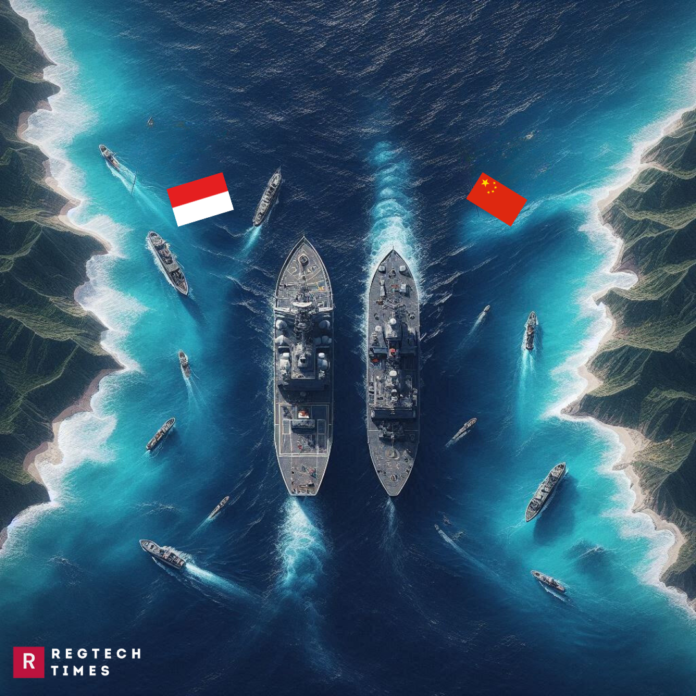Indonesia has firmly stated that it does not recognize China’s claims over the South China Sea, despite recent agreements with Beijing. The two countries recently signed a joint maritime development deal, which has raised concerns among analysts who warn that the agreement could threaten Indonesia’s sovereignty.
Indonesia’s Firm Stance on Sovereignty
The issue revolves around China’s long-standing claim over almost the entire South China Sea, marked by what is known as the “nine-dash line” on Chinese maps. This claim cuts into the exclusive economic zones (EEZ) of several neighboring countries, including Indonesia.
The South China Sea is one of the world’s most important maritime regions, rich in natural resources like fish and oil. Additionally, it is an essential link for global trade. For years, China has clashed with its Southeast Asian neighbors over territorial rights in these waters. The nine-dash line is central to China’s claim, but many countries, including Indonesia, have rejected this line, calling it invalid and without legal basis.
Indonesia is not a claimant state in the South China Sea, according to the country’s foreign ministry. The ministry has emphasized that Indonesia does not have overlapping jurisdiction with China in this region. Therefore, Indonesia believes it is unaffected by China’s broad claims. This firm position was reiterated following the joint maritime agreement signed between Indonesia and China.
The Controversial Joint Development Agreement in the South China Sea
While Indonesia has stood firm on its sovereignty, it recently signed an agreement with China during a visit by Indonesian President Prabowo Subianto to Beijing. This agreement outlined joint development efforts in areas where both countries have overlapping maritime claims. The statement issued after the meeting mentioned that the two countries had reached a “common understanding” on development activities in these areas. This included cooperation on fisheries and fish conservation, both important economic activities in the South China Sea.
Strategic Shift: Prabowo’s First Foreign Trip to China Sparks Strong Ties
However, the language in the joint statement raised concerns among some analysts. The mention of “overlapping claims” led to fears that Indonesia might be seen as recognizing China’s vast territorial assertions. Some critics argued that this agreement could be interpreted as acknowledging China’s control over areas it claims in the South China Sea, potentially jeopardizing Indonesia’s rights to the resources in its exclusive economic zone. Indonesia’s EEZ includes the North Natuna Sea, an area near the Natuna islands, where Indonesia conducts its own fishing and energy activities.
Although the agreement focuses on economic cooperation, analysts cautioned that it could be viewed as a shift in Indonesia’s stance on territorial sovereignty. The inclusion of the term “overlapping claims” could be seen as a concession to China, raising the risk that it might undermine Indonesia’s control over the North Natuna Sea, a crucial part of its maritime territory.
Vietnam’s Dangerous Silence: Ignoring Malaysia’s Protest in South China Sea Dispute
Indonesia’s Reassertion of Sovereignty
Despite these concerns, Indonesia’s foreign ministry was quick to reaffirm its position. It issued a statement on Monday, clarifying that the joint agreement with China does not change Indonesia’s stance on the South China Sea. According to the ministry, the agreement has no bearing on Indonesia’s sovereignty, sovereign rights, or jurisdiction in the North Natuna Sea. Indonesia emphasized that China’s claims in the South China Sea have no international legal basis and that the partnership would not affect Indonesia’s control over its maritime territories.
The issue of the South China Sea has been a point of tension between China and several Southeast Asian nations. China’s assertiveness in the region, particularly its actions around the nine-dash line, has been widely criticized. The Chinese government claims historical rights to most of the South China Sea, including waters that are also claimed by countries like Vietnam, the Philippines, Malaysia, and Brunei. Indonesia has consistently rejected these claims, arguing that they violate international law.
Teresa Magbanua: The Philippines Faces Tough Reality in South China Sea Dispute
The situation is further complicated by the presence of Chinese coast guard ships and fishing vessels patrolling the disputed waters. These vessels are often accused by other Southeast Asian countries of being aggressive and disrupting economic activities, such as fishing and oil exploration, within their exclusive economic zones. China, however, defends its actions, stating that its vessels are safeguarding Chinese territorial rights.
Indonesia’s position is clear: it will not allow China to extend its claims into Indonesian waters. Despite this, the recent agreement with China on joint development has sparked a debate over whether such cooperation could inadvertently legitimize China’s broader territorial claims in the region.
While Indonesia has stated that the agreement is focused solely on economic cooperation, the inclusion of a reference to overlapping claims has left some questioning whether it might be seen as a shift in Indonesia’s approach to the South China Sea dispute. The signing of the agreement may have been driven by a desire to strengthen economic ties with China, but some experts warn that it could have broader implications for Indonesia’s territorial integrity.


